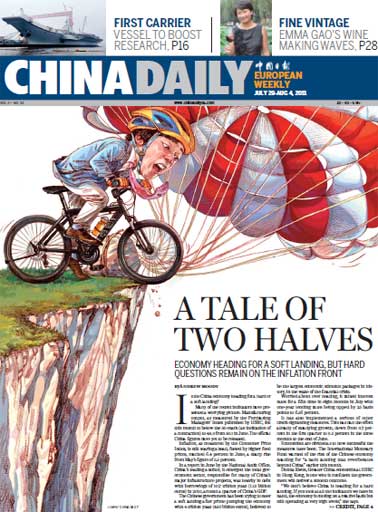Financial sector short of talent
Updated: 2011-07-22 11:09
By He Wei (China Daily European Weekly)
 |
|
The Lujiazui financial district in Shanghai. The difficulty in hiring and retaining high-caliber professionals has become the biggest business challenge for companies in the Chinese financial hub. Shen Jingwei / for China Daily |
Lack of skilled professionals in Shanghai inhibiting the city's development as a financial hub
While regulations are being finessed for the launch of the Shanghai international board, which would allow foreign companies to list on the Chinese mainland for the first time, attention is also being focused on one crucial element: a chronic lack of skilled financial professionals.
Foreign banks and local securities companies are scurrying to find workers with the right skills and experience. Even Tu Guangshao, Shanghai's vice-mayor in charge of finance services, says the greatest inhibitor to the city's bid to be a world financial center is the lack of professionals.
The latest statistics show that the number of people working in finance in Shanghai is 300,000, up from the 200,000 in 2006. However, that is only 2 percent of the city's total work force. In New York, the figure is 10 percent.
There are fears this could hamper China's ambition to turn the city into a competitive international financial center that could rival New York, London, Hong Kong or Singapore by 2020.
Career opportunities
In an April survey conducted by eFinancialCareers.com, a leading global website for career advice in banking and financial markets, 56 percent of responding companies said they are looking to increase their head count in 2011. However, 95 percent of them believe there is shortage of skilled talent in the current market. As many as 28 percent described the shortage as "long-existing".
Further complicating matters is a tendency among those already employed in the sector to switch jobs.
Fluidity is typical in the financial services industry, according to George McFerran, head of Asia-Pacific at eFinancialCareers. Referring to another survey his company conducted, he says: "While 77 percent of respondents expressed their satisfaction with their current job, they said they are still continuously looking for better career opportunities. Another 13 percent said that they were unhappy and wanting to change jobs as soon as possible."
Mark Hall, a manager at Kelly Services China, a human resources and consulting company, echoes the sentiment.
Hall cites a recent study that showed the majority of financial organizations (93 percent) reported a lack of middle- to senior-level professionals with relevant skills, which had a negative effect on their ability to serve clients.
"The difficulty in hiring and retaining middle- to senior-level professionals has remained the top business challenge for companies," Hall says.
Furthermore, the greatest negative effect is experienced by the private equity and trust ends of the business, followed by funds, securities, insurance and investment banking. The skills reported to be in shortest supply are those considered most important for middle-ranking and senior executives in the sector. Initiative and enterprise - considered to be two of the most important skills - are cited among the top skills in short supply.
"As the financial services sector in China is constantly challenged by changes, organizations are looking out for middle- to senior-level professionals who possess high levels of initiative and the ability to build long-term relationships with clients as well as autonomously sell products and services that are targeted to individual client needs," Hall tells China Daily.
This has mirrored findings from eFinancialCareers, which identified corporate banking relationship managers, private banking relationship managers and risk managers as the top three professionals most wanted in the talent pool. "As the financial sector is by nature a service industry, it is highly essential to maintain relationships to draw clients and sell products," McFerran says.
E-paper

Double vision
Prosperous Hangzhou banks on creative energies to bridge traditional and modern sectors
Minding matters
A touch of glass
No longer going by the book
Specials

Carrier set for maiden voyage
China is refitting an obsolete aircraft carrier bought from Ukraine for research and training purposes.

Pulling heart strings
The 5,000-year-old guqin holds a special place for both european and Chinese music lovers

Fit to a tea
Sixth-generation member of tea family brews up new ideas to modernize a time-honored business
